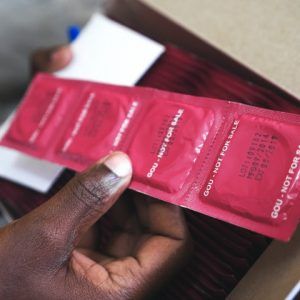It is too unfortunate that in Africa, sex has been demonised, something that has propelled the rise of unwanted pregnancies and sexually transmitted diseases. This has been so loud, so much so that parents and society would rather condemn sexual acts than talk about them. Why should, teenagers and the youth, for instance, not have intercourse? What would the repercussions be? If they cannot wait for their ideal partner in the future, would it be right to use a condom or should they just hide and grind crossing their fingers not to contract HIV/AIDS and syphilis, among other STDs?
We can no longer look the other way, we need to face this and talk about it.
The thought of buying condoms to engage in “bad manners” is one among the many reasons people, including married ones, find it difficult to make a purchase. Dominic, a pharmacist I approached, gave a hearty laugh when I sought his observation on condom purchase.
“There are so many customers who take several rounds waiting for other buyers to complete their purchases. As soon as the counter is clear they will hurriedly walk in and shyly point at the condom section, saying, “nipe ile” (give me that). As soon as I hand them the pack, they quickly hide it away in their pockets, bags, or whatever else they are carrying,” he says.
Others, as Dominic notes, engage him in irrelevant topics, such as the weather and politics before getting to the point.
Dr. Blentine Juma of the Fatima Mission Hospital says that both the old and the young are not only afraid of buying condoms but they also shy away from picking the free ones from hospital condom cases. The older ones, she says, fear being labelled as awkward or adulterous.
Men with less bargaining power in terms of size, for instance, as the doctor highlights, are worse when it comes to making a purchase. Nipe hiyo ya size ndogo, to mean, hand me the one with the smallest fit, would perhaps burn their ego in a million flames. On the other hand, as Juma notes, the young are too embarrassed and do not want people thinking they are too young to have sex.
Way forward?
While adolescents and the youth have alike chosen to ignore the holy book, abstinence has been a rod they have chosen to forego to strike the heat of the moment. However, in the evil times of peer pressure overload and inappropriate content from media sources, abstinence may not be the most realistic approach.
In that case, it may be more actionable to advise the millennials and Generation Z (ages 15 – 24) on the need for proper use of condoms. As much as this is a grey area that is rather not touched, children as young as 10 years, as I found, are engaging in sexual acts. Unfortunately, most of them do not use any form of contraception.
The alarming number of school dropouts resulting from pregnancies among school-going girls is a clear indication that the young generation is sexually active. It also means that parents are afraid of engaging in this “gross topic” with their children. When COVID-19 hit the country, in just three months, at least 152,000 teenage pregnancies were reported. Today, the estimated number of adolescents living with HIV, according to a 2018 HIV Impact Assessment survey is 133,455.
Well, whether to introduce a condom policy or not in primary and secondary schools is subject to debate by decision-makers, parents, the government, educators, and health providers. That aside, while the shortage of this essential commodity is alarming, the truth is that there is still a notable stigma around sex and sexual health. The fear of buying condoms has not started now, especially when it comes to the youth and teenagers. A survey done in 1988 will tell you so.
Also Read: Sex Education: Whose Responsibility Is It?





